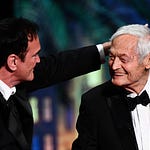On this week’s episode, Sonny Bunch (The Bulwark), Alyssa Rosenberg (The Washington Post), and Peter Suderman (Reason) ask if you’re ready for the nascent Mattel Cinematic Universe (as chronicled by the New Yorker here) currently being developed by Hollywood. If you enjoyed Barbie, you’re gonna love Uno! Speaking of: did we love Barbie? It’s the hit of the summer—and could wind up being the highest-grossing movie of the year—but is it any good? If you enjoyed this episode, please share it with a friend!
One quick programming note: No bonus episode this week thanks to home maintenance issues at Casa Bunch, unfortunately. But we’ll be back next Friday with some hot additional podcasting.
















We're All 'Barbie' Girls, It's a 'Barbie' World